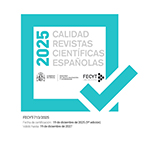La influencia de la obra de Vilfredo Pareto en el análisis económico moderno: ¿Un obstáculo al desarrollo de la economía de la felicidad?
Resumen
En este artículo destacamos la influencia profunda y duradera de Pareto en el análisis económico moderno. Ponemos el énfasis en su teoría del valor, basada en la utilidad. Este autor, en torno a 1900, inicia el giro hacia una teoría de la utilidad ordinal y objetiva. El principal objetivo de nuestro trabajo consiste en trazar el hilo conductor de ideas económicas que consideramos muy relevantes: desde Pareto hasta la economía ortodoxa actual; y desde Bentham hasta la vuelta a la felicidad como objeto de estudio de la ciencia económica, principalmente en el siglo XXI. Así, podemos afirmar que la influencia de Pareto ha perdurado, por lo menos, todo el siglo XX, retrasando bastante el resurgimiento de la economía de la felicidad. Por último, planteamos que sería muy fructífero que esta disciplina y la teoría recibida se complementaran.
Descargas
Descarga artículo
Licencia
La revista Iberian Journal of the History of Economic Thought, para fomentar el intercambio global del conocimiento, facilita el acceso sin restricciones a sus contenidos desde el momento de su publicación en la presente edición electrónica, y por eso es una revista de acceso abierto. Los originales publicados en esta revista son propiedad de la Universidad Complutense de Madrid y es obligatorio citar su procedencia en cualquier reproducción total o parcial. Todos los contenidos se distribuyen bajo una licencia de uso y distribución Creative Commons Reconocimiento 4.0 (CC BY 4.0). Esta circunstancia ha de hacerse constar expresamente de esta forma cuando sea necesario. Puede consultar la versión informativa y el texto legal de la licencia.
La revista Iberian Journal of the History of Economic Thought no cobra por tasas por envío de trabajos, ni tampoco cuotas por la publicación de sus artículos.









